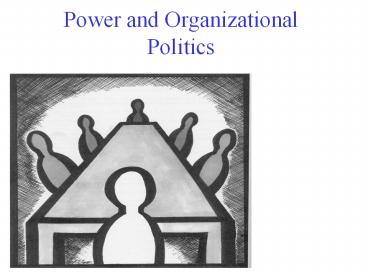Power and Organizational Politics - PowerPoint PPT Presentation
1 / 20
Title:
Power and Organizational Politics
Description:
Power and Organizational Politics Politics Politics refers to the use of power and authority to influence organizational outcomes. Historical Views of Politics ... – PowerPoint PPT presentation
Number of Views:1761
Avg rating:3.0/5.0
Title: Power and Organizational Politics
1
Power and Organizational Politics
2
Politics
- Politics refers to the use of power and authority
to influence organizational outcomes.
3
Definitions
Power-- the capacity to ensure the outcomes one
wishes and to prevent those one does not
wish. Influence-- the capacity to affect
others. Authority-- the capacity to give
commands, enforce obedience, take action, or make
final decisions.
4
Historical Views of Politics
- Maciavelli (early 1500s) The Prince
- Assume that people are ungrateful, fickle, and
deceitful - The purpose of political leadership is to secure
and maintain power - A good leader is independent and dominates people
5
Historical Views of Politics
- Maciavelli (early 1500s) The Prince
- The End Justifies the Means
- The leader can be ruthless if necessary
- Machiavellian means characterized by cunning,
duplicity, or bad faith
6
Historical Views of Politics
- Webers forms of power
- Charismatic
- Traditional
- Legal-Rational
- The Iron Cage of Rationality
- Compulsion of Fairness
7
Changing Perspectives on Workers and Organizations
- A social-psychological view of power
- Power is not necessarily open coercion,
influence, or control - Power is the perception of others that the power
wielder could exercise coercion, influence, or
control if he or she chose to do so - How much power you have is based on how much
power think you have! Power must be granted
8
Questioning Power and Authority
- 1960s Radicals
- Organizational politics is outmoded and
unproductive - Traditionally executive power is based on the
idea of ownership - 1990s the idea of Servant Leadership and
Empowerment
9
Questioning Power and Authority
- Power is the opposite of dependency
- Organizations seek to minimize dependency by
- Seeking prestige
- Engaging in cooperative strategies
- Contracting
- Co-opting
10
(No Transcript)
11
Recognizing Organizational Politics
- Use of power increases when structure is
decentralized, resources are scarce, there is
disagreement on goals, and there is uncertainty
about technologies - In other words
- When resources are limited, goals and processes
are unclear, Power Politics are very likely
12
Recognizing Organizational Politics
- Three Faces of Power
- First Face Overt Coercion
- Second Face Exclusionary Actions avoid
challenges - Third Face Hegemonic control convince me that
what you want is what I want
13
Balancing Power
- Four styles to balance or equalize power
- 1 decrease needs or demands
- 2 increase alternative sources of getting what
you want - 3 increase others needs or demands for us
- 4 decrease other peoples alternative sources
(special expertise) - Options 1 and 2 create psychological distance
- 3 and 4 result in a stronger work commitment
14
(No Transcript)
15
Structural Aspects of Power
- Opportunity
- Mobility
- Perceived political power
- Dependency
- Influence
- Rewards
- Numerical Representation
16
Power Politics
- Positive or Destructive Force?
- Power politics help organizations to adapt and
interact with the environment appropriately - Managers are dependent upon workers
- Workers have limited time, energy, and talent
- Power is needed to manage these
- Some use power for personal and not
organizational goals - How to handle power
- Limit access to decision makers
- Alter decision criteria to performance
- Offer financial incentives to discourage
political activity
17
Empowerment
- Empowerment is the development of personal power
of those in the organization to achieve their
goals - Power is traditionally seen as a relational
construct (delegation or sharing power) - Power as a motivational construct creating
motivation and feeling of personal efficacy
18
Empowerment
- Conditions of moving from Powerlessness to
Empowerment - Conditions leading to feelings of powerlessness
- Strategies to increase personal efficacy
(participative management) - Feedback
- Reinforcement of empowerment
- Persistence of new behavior
19
Empowerment
- Empowerment cannot be granted but has to be taken
by the individual - The conditions for empowerment can be fostered
20
Ways of Acting
- Consider all your sources of power
- Make yourself indispensable
- Take charge of your own empowerment
- Use power constructively and effectively
- Devote energy to clarifying goals
- Support and foster empowerment of others
- Be aware and think about how political issues
- Be nice































